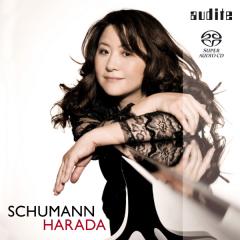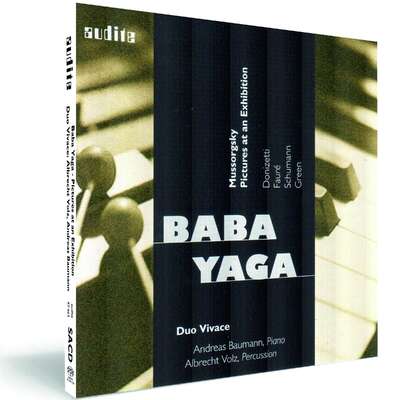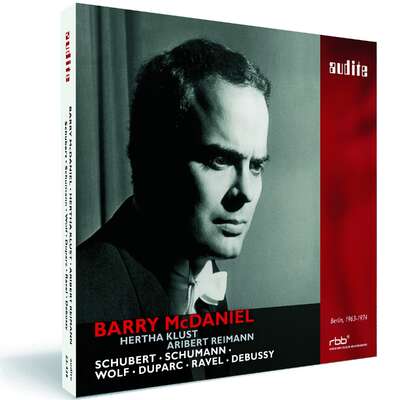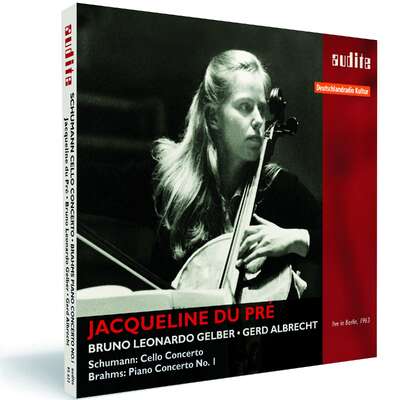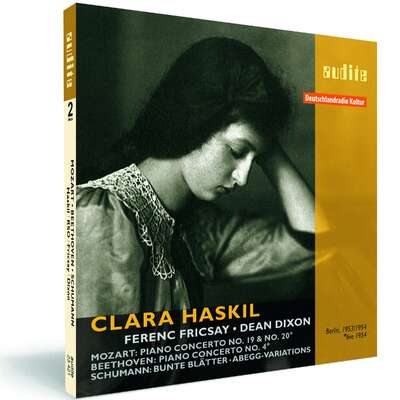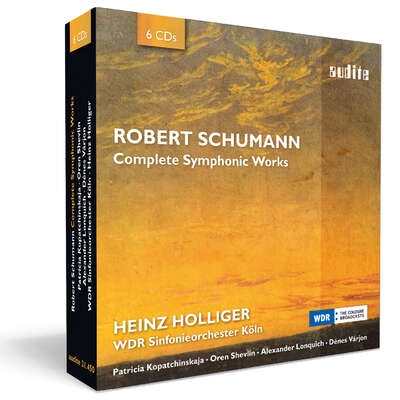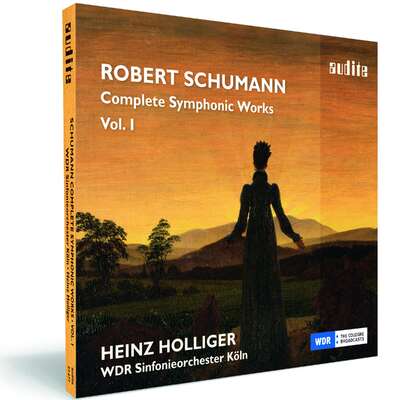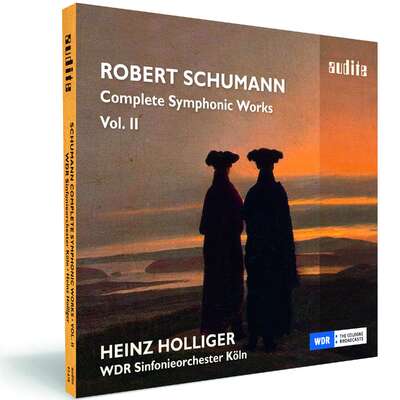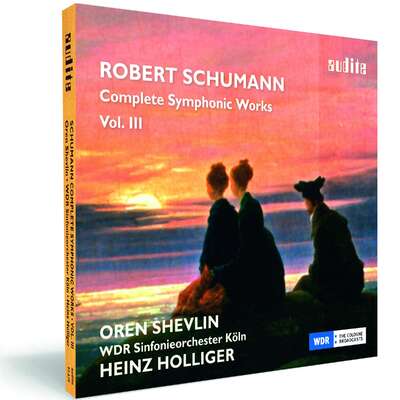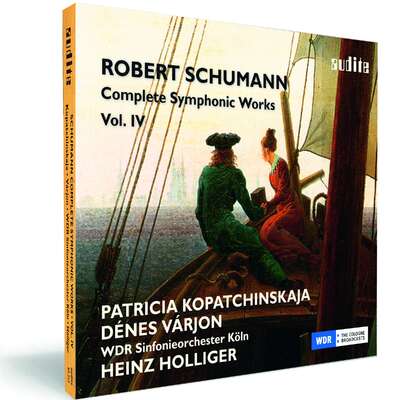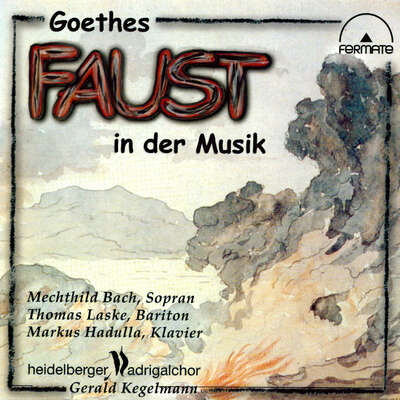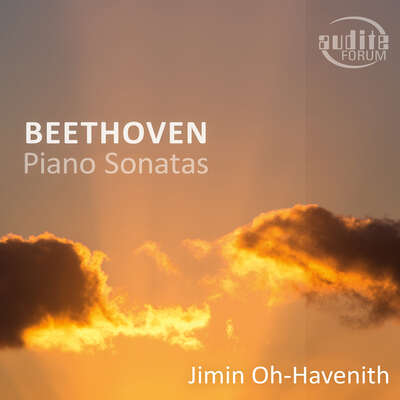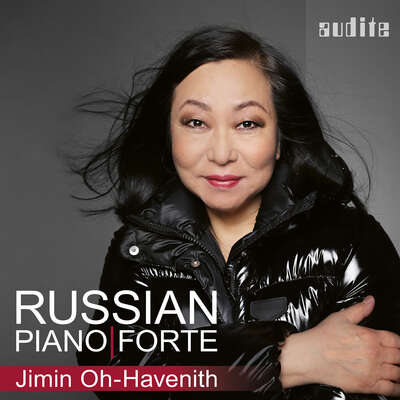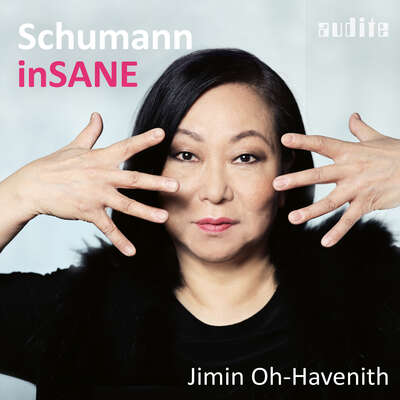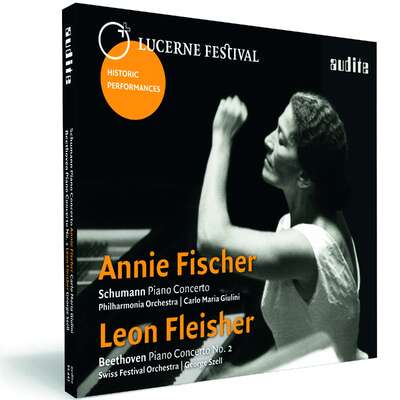
With her interpretation of these three key works by Robert Schumann, Hideyo Harada demonstrates the dramatic range of the contrasts in his music. She moves the poetic elements close to the nature of the language, creating clear and vivid contours within the complex routes of Schumann’s music. The result is a transparent, and at the same time colourful, portrait of musical romanticism.more
"Nun erweist die Japanerin Robert Schumann die Ehre. Je öfter man Haradas Interpretation der Fantasie op. 17 lauscht, desto mehr intime Details und poetische Feinheiten ziehen den Zuhörer in ihren Bann. Eine CD wie eine Schatztruhe." (Rondo)
Details
| Robert Schumann: Fantasie op. 17, Kreisleriana op. 16 & Arabeske op. 18 | |
| article number: | 92.577 |
|---|---|
| EAN barcode: | 4022143925770 |
| price group: | ACX |
| release date: | 1. April 2010 |
| total time: | 78 min. |
Bonus Material
Informationen
Following her highly successful recordings on SACD format of works by Grieg (aud. 92.555) and Tchaikovsky and Rachmaninov (aud. 92.569), the Japanese pianist Hideyo Harada presents her third SACD with three key works by Schumann, celebrating the 200th anniversary of his birth.
In a coherent interpretation, Schumann’s works offer several mysteries and countless possibilities. With her new recording, Hideyo Harada exhibits a highly personal and carefully considered reading of three major romantic works. She realises with remarkable plasticity Schumann’s pivotal concerns from a crucial period of his artistic development: the wide, quasi-narrative context including stark contrasts and differentiated, filigree details; the characteristically free flow of tempo and the clear contours of the complex course of his music. Relationships to romantic literature (“Kreisleriana”), to the classical legacy of spacious musical design (“Fantasie” in C major) and to abstract visual art (“Arabeske”) accentuate the open horizon under which Schumann saw his music between 1836 and 1838.
Reviews
FA. Magazin | August 2013 | Dr. Reinhold Martin | August 1, 2013
Dass unter dieser sehr persönlichen Sichtweise die widerspruchsvolle Seele der Komposition nicht leidet, sondern im Gegenteil noch stärker berührt als bei den ungeniert himmelhoch jauchzend und zu Tode betrübt ausspielenden Pianisten spricht für die künstlerische Reife der Japanerin, die mit einer überaus farbenreich nuancierten Pianistik begeistert und über eine hochgradige Virtuosität verfügt [...]Mehr lesen
klassik.com | 15.02.2012 | Christian Vitalis | February 15, 2012 | source: http://magazin.k... Schumann zum (Mit-)Träumen
Die japanische Pianistin Hideyo Harada fühlt sich – das verrät einMehr lesen
Pianist | February / March 2011 | Marius Dawn | February 1, 2011 Marius Dawn gives equal time to 20I0's other birthday boy, Schumann, and finds discs that best captured the composer's restless spirit by Angela Hewitt, Oleg Marshev and Mitsuko Uchida
The two big composer birthdays of 2010 were Chopin and Schumann. Both wereMehr lesen
Mannheimer Morgen | 20. Januar 2011 | hub | January 20, 2011 Zerrissenes
Sie meidet dekorative, pathetische Floskeln. Beste Voraussetzungen alsoMehr lesen
Pforzheimer Zeitung | 4. Januar 2011 | Thomas Weiss | January 4, 2011 Klangvolles Schumannspiel
Nach ihren ersten beiden CDs, die Grieg sowie Rachmaninoff und TschaikowskyMehr lesen
Gramophone | December 2010 | Bryce Morrison | December 1, 2010 Schumann's virtuoso demands hold no terrors for this young Japanese pianist
Hideyo Harada is a prize-winning pianist trained in Japan, Germany and Russia who offers a Schumann recital showing the composer at his dizzying andMehr lesen
This is notably true in the Fantasie's finale, where you are hardly carried away by music once described as being like constantly shifting sunset vapour. The silvery chiming at the centre of Kreisleriana's opening is overinterpreted (try Géza Anda on Testament for another world of elegance and finesse). The fifth section from the same work is another example of a pianist disinclined to leave well alone, and even in smaller, less demanding fare such as the Arabeske (offered, as it were, as an encore), the playing is marred by selfconscious voicing and inflection. Such intense scrutiny is a far cry from, say, Pollini's formidably patrician style in the Fantasie (DG, 6/96) or Argerich's flashes of summer lightning in both the major works (RCA, 1/91). Audite's sound, like the playing, is bold and brilliantly lit.
Fanfare | Issue 34:2 (Nov/Dec 2010) | Steven E. Ritter | November 1, 2010
Strange that only three years ago Audite issued another Schumann piano disc that also contained the marvelous Fantasy. Nicolas Bringuier was theMehr lesen
I find myself leaning toward Rabinowitz in this one; the sound is truly spectacular, even more vivid and present than on the Bringuier recording that I was so taken with in 2007. But interpretatively I have some problems with this issue. For one, it has to be the slowest Fantasy I have ever heard. Just putting it side-by-side with the Bringuier one sees that Harada is a full six and one-half minutes slower than her company cohort, spread fairly evenly over all three movements. I have always thought that Schumann played slowly could easily be made to sound like Liszt, and this is a prime example, especially in the rather harmonically divergent and offbeat first movement. The middle movement is rather impervious to slow-downs in general, but the last must have some connecting tissue to support it, and while I am able to simply sit back and indulge my senses in her lovely tone I cannot get over the frustration of the tempo wrecking the emotional moment.
There has been such a slew of excellent Kreislerianas recently that it is beginning to get tricky making judgments about the piece. Anyone with a technique can bring the thing off to a certain extent, and Harada has that; but again I detect a certain tendency to not only smell the roses but prune and fertilize them as well, and that dissolves some of the momentum even though the work is character-oriented per movement. As I have mentioned before, there is a subtle thread that connects even the most disparate of Schumann’s separate pieces within one work, and if that thread is severed things become more difficult to comprehend.
This is not to say that these are uninteresting performances or badly played—far from it. But competitively more is needed. Harada does this in the Arabeske, one of the best versions I have heard. This time the propensity for microscopic examination does not get in the way, and her tone is simply stunning. But for the Fantasy I would stick with Richter, Hamelin, or the abovementioned Bringuier, while Kreisleriana fends better under Horowitz, Würtz, or Argerich.
American Record Guide | 01.11.2010 | Auerbach | November 1, 2010
When measured against all the other Schumann releases I have reviewed in the past year, this one places dead last. In almost every track there is atMehr lesen
www.ResMusica.com | 29 octobre 2010 | Jean-Luc Caron | October 29, 2010 Un Schumann consciencieux, convenable et probe
Le bicentenaire de la naissance de Frédéric Chopin aura largementMehr lesen
Yomiuri Shimbun | October 21, 2010 | - | October 21, 2010
Hagesii Henten, tsuyoi Kosei
Schumann “Fantasie”, “Kreisleriana”, “Arabeske”
Kazukazu no Concours de Nyuusyou wo hatashi, Doitsu wo Kyoten ni KatsudouMehr lesen
Die Rheinpfalz | Samstag, 18. September 2010 - Nr. 217 | pom | September 18, 2010 Schumann-Werke mit Hideyo Harada
Dass es bei Schumann allerdings nicht immer so beschaulich und betulichMehr lesen
Piano - La lettre du musicien | No. 24 (2010-2011) | August 1, 2010 Hideyo Harada joue Schumann
La jeune pianiste japonaise Hideyo Harada (premier prix du concoursMehr lesen
Wochen-Kurier | Mittwoch, 21. Juli 2010 - Nr. 29 | Michael Karrass | July 21, 2010
Nach den äußerst erfolgreichen Veröffentlichungen der Werken von GriegMehr lesen
ouverture Das Klassik-Blog | Samstag, 17. Juli 2010 | July 17, 2010
Hideyo Harada spielt drei frühe Schlüsselwerke von Robert Schumann: DieMehr lesen
Audiophile Audition | July 14, 2010 | Gary Lemco | July 14, 2010
Japanese pianist Hideyo Harada is a pupil of Hans Kann and ViktorMehr lesen
www.ClassicsToday.com | July 2010 | Jed Distler | July 1, 2010
Hideyo Harada's highly calculated, painstakingly detailed pianism seemsMehr lesen
International Piano | July / August 2010 | Edward Bhesania | July 1, 2010
Hideyo Harada trained in her native Japan, as well as in Europe and, latterly, at the Moscow Conservatory with the venerable Victor Merzhanov (stillMehr lesen
Her Kreisleriana displays the same combination of athleticism and poetry. An increasingly transparent and deftly spun middle section in no.3, 'Sehr aufgeregt', emerges into a fiery climax, amply underlining the wide mood-swings of Johannes Kreisler – the unstable, borderline-genius music-master of E.T.A. Hoffmann's creation, on whom Schumann based this set of fantasias.
Young Brazilian-born, Paris-based Felipe Scagliusi features Schumann's Piano Sonata no.3 as the focus of his new disc, a work still unjustly neglected despite being championed by Horowitz. Scagliusi is strongest here in the darkly-tinged slow variations movement, based on an Andante theme by the young Clara Wieck. What hinders the rest of the sonata is a lack of surging heroism, which tends to flatten even Scagliusi's unarguably impressive quicksilver articulation in the Finale. 'Tumult and chaos are expressed in a grandiose style,' Harry Halbreich is quoted as saying of the first movement in the booklet notes. Something of this spirit seems to escape Scagliusi. The sonata's flattened trajectory spills into the first of the three op.28 romances in particular, and in no.2 a more lingering, cantabile line is necessary. Scagliusi has scaled the technical demands of these works, but the peak of spontaneous expression seems a short way into the distance.
Claves' ongoing series of Schumann's complete solo piano works continues with Swiss pianist Francesco Piemontesi. There is an immediacy to his characterization of themes, a strikingly coloured quality throughout – even in the tumultuous first movement of the third sonata – though some listeners may wish for a shade more heft. This is neat and natty Schumann, and no worse for it: its freshly sprung feel comes to the fore in the third sonata's Scherzo, while the Finale sparkles with clarity.
Piemontesi's control of intensity in the Fantasie is one of its key features, giving the hymn-like 'Im Legendenton' (In the manner of a legend) section an unusual transparency. His distinctive musical personality and unshowy approach bring a new lightness, for example, to the often stridently march-like second movement of the Fantasie. The turbulent Allegro vivace first movement of the sonata no.1 is served up with a degree of light majesty and the second-movement Aria achieves a twilit colouring. This isn't the gutsiest Schumann playing, but it is unswervingly sure-footed, and attests to a genuine talent. Though the works on Tzimon Barto's disc are, for many, not top-drawer Schumann, it's rewarding to have the two piano-concertante works (op.92 and op.134) as bedfellows. Nestling between them is the rarely heard 'Ghost' Variations, though with the five variations all reflecting the stasis of the theme, this is perhaps a piece that appeals mainly to collectors.
The pianist's role in op.92 is more restricted than in op.134, which gives American Tzimon Barto more scope to flex his pianistic muscle, which he does with flair. The Six Etudes were written, following a period of intensive counterpoint study, for a kind of pedal extension device placed under the grand piano, to emulate the organ pedals. These are wonderful pieces, and show Eschenbach and Barto well matched both in touch and in temperament.
At around 56 minutes' duration, Claire-Marie Le Guay's CD may not be the most generously filled release, but this German quartet and French pianist give unstintingly of their considerable energies. In the first movement of the Piano Quartet, the languorous Sostenuto introduction bursts into an Allegro with focused rhythmic drive. The following Scherzo has a brilliant sense of urgency. The piano sound is present enough to highlight Le Guay's agile touch, but it blends in well with the ensemble as part of a soundscape that is rich and detailed.
In the Piano Quintet the risingscale figure of the Scherzo is bracingly articulated, and the same movement's rustic second trio is as engaging as its bristling coda. The finale's closing fugue, which combines its own march-like theme with the first movement's opening theme, gathers a formidable momentum.
Stereo | 7/2010 Juli | Ingo Harden | July 1, 2010
Was auch immer das Schumann Jahr uns an neuen Aufnahmen noch bescherenMehr lesen
Bayern 4 Klassik - CD-Tipp | 24. Juni 2010 | Michael Schmidt | June 24, 2010 Hideyo Harada spielt Klavierwerke
Sie ist eine in Deutschland lebende Japanerin, die in zahlreichen Wettbewerben ausgezeichnete Pianistin Hideyo Harada. Unter anderem gewann sie 1984Mehr lesen
Auch wenn Hideyo Harada weltweit konzertiert und gemeinsam mit Schauspielern wie Corinna Harfouch, Katja Riemann oder Hanns Zischler ungewöhnliche musikalisch-literarische Programme gestaltet, ist sie nur wenigen bekannt. Dabei machte die japanische Pianistin mit CD-Einspielungen von Klavierwerken Griegs und Tschaikowskys ebenfalls auf sich aufmerksam.
Jetzt erschien beim Label "audite" ihre neue CD, auf der sie – wen wundert's im Schumann-Jahr – Klavierwerke von Robert Schumann eingespielt hat. Doch Hideyo Harada ist durchaus eine eigene Schumann-Perspektive gelungen, die weniger den leidenschaftlich-romantischen Ausdruck anstrebt als vielmehr den subtilen Zwischentönen dieser Musik nachspürt. Man fühlt sich beim Zuhören gleichsam in die Welt des introvertiert-verträumten Eusebius versetzt – um einmal diese Fantasiefigur Schumanns zu bemühen, die im Kontrast zum extrovertiert-expressiven Charakter ihres Gegenpols Florestan steht.
Apollinische Klarheit
Es sind keine auffälligen Rubati oder überraschenden Betonungen, die das Schumann-Spiel der Hideyo Harada so spannend machen, sondern vielmehr eine geradezu apollinische Klarheit auch in den leisesten Passagen und ihre insgesamt überaus differenzierte Klanggebung. Mit großer musikalischer und pianistischer Sicherheit bringt Hideyo Harada die vielschichtige Dialektik aus Zartem und Ungestümem in Schumanns Klavierpoesie zum Ausdruck. Ihr eher verinnerlichtes, einfühlsames und dabei keineswegs blutleeres Ausleuchten der komplexen Seelenzustände in Schumanns Musik bleibt zudem immer in lebendig-organischem Fluss.
Mitreißende Gesamtdramaturgie
Trotz allem Gespür für die feinen Kontraste vermag die japanische Pianistin dieser Musik zugleich eine mitreißende emotionale Gesamtdramaturgie zu verleihen. Insgesamt also eine auch wegen des brillanten und zugleich sehr natürlichen SACD-Klangbildes rundum empfehlenswerte Aufnahme. Selbst für diejenigen, die schon Einspielungen der C-Dur-Fantasie, den "Kreisleriana" oder der Arabeske op. 18 - alles ja durchaus populäre Schumann-Meisterwerke – im Plattenschrank haben.
Ostthüringer Zeitung | Freitag, 11. Juni 2010 | Dr. sc. Eberhard Kneipel | June 11, 2010 Jubiläumsgaben für Schumann
Seit dem 8. Juni ist Robert Schumann der Jubilar vom Dienst: Sein 200.Mehr lesen
Die Welt | 8. Juni 2010 | June 8, 2010
Neue Aufnahmen zum Schumann-Jahr
Klaviersolowerke von Eric Le Sage bis zur vorletzten Folge fortgeschritten
Die CD-Produzenten haben sich zum Schumann-Jahr zurückgehalten. Zwar gibtMehr lesen
allmusic.com | 3rd of June 2010 | Uncle Dave Lewis | June 3, 2010 Schumann: Fantasia; Kreisleriana; Arabeske
Audite's super audio CD release Schumann: Fantasia; Kreisleriana; ArabeskeMehr lesen
Fono Forum | Juni 2010 06/10 | Ingo Harden | June 1, 2010 Klartext, Klarsicht
Was auch immer das Schumann-Jahr uns an neuen Aufnahmen noch bescheren wird: Dieser dritten Audite-Produktion mit Hideyo Harada wird ein Platz imMehr lesen
Nur wer im Falle Schumanns romantischen und genialischen Überschwang für unverzichtbar hält, wird bei Harada nicht voll auf seine Kosten kommen. Aber es geht eben auch anders: Die in Deutschland lebende Japanerin ist eine Pianistin der klassisch klaren Umrisse (und einer inzwischen hervorragenden Pianissimo-Kultur), die aber die Werke fabelhaft auszuhören versteht und manuell in der Lage ist, ihre Vorstellungen perfekt zu realisieren – sogar die berüchtigt heikle Sprung-Coda des Mittelsatzes der Fantasie ist konturiert bewältigt. Dabei erspart sie sich und ihren Hörern alle konventionellen Vortragsgesten wie aufgesetzte Rubati oder zusammenhanglos hervorgehobene Melodietöne und Mittelstimmen, mit denen Klavierspieler so gern „auf Romantik“ machen. Harada spielt nur, was die Noten hergeben, dies aber mit aller Entschiedenheit und viel Fantasie. So gelingt es ihr, die bekannt „schwierigen“, versickernden Stellen in den Ecksätzen der C-Dur-Fantasie oder ähnlich heikle Passagen der„Kreisleriana“ wie selbstverständlich mit Leben zu erfüllen: eine fabelhaft erhellende Darstellung.
Der Reinbeker | 17. Mai 2010, Nr. 9 | Peter Steder | May 17, 2010 Jazz und Klassik
„Chesky Records“ gehört unbestritten zu den führenden audiophilenMehr lesen
Piano News | Mai / Juni 3/2010 | Carsten Dürer | May 7, 2010
Die japanische Pianistin Hideyo Harada ist kein unbeschriebenes Blatt mehr.Mehr lesen
Pizzicato | N° 203 - 05/2010 | Alain Steffen | May 1, 2010 Atemberaubend
Man weiß, dass es eine Unzahl asiatischer Musiker gibt, die atemberaubende Techniker sind, doch denen das tiefe Verständnis für die europäischeMehr lesen
Crescendo | Juni / Juli 2010 - 4/2010 | Martin Morgenstern | May 1, 2010 Mit eiserner Hand
Die wenigsten Leser werden Hideyo Harada auf dem Schirm haben. DieMehr lesen
Rondo | April 2010 | April 1, 2010
Vor drei Jahren hatte Hideyo Harada mit einer wundervollen Grieg-HommageMehr lesen
Westdeutsche Allgemeine Zeitung | April 2010 | Hajo Berns | April 1, 2010
Geistesblitz trotzt Tastendonner
CD-Einspielungen von Arcadi Volodos, Boris Berezovsky und Hideyo Harada machen Lust auf den Klaviersommer
Essen. Die Freunde des Klavier-Festivals schauen längst erwartungsfroh aufMehr lesen
www.classicstodayfrance.com | Janvier 2010 | Christophe Huss | January 1, 2010
Contrairement à Florian Uhlig (Haenssler), intello du piano, dont leMehr lesen



